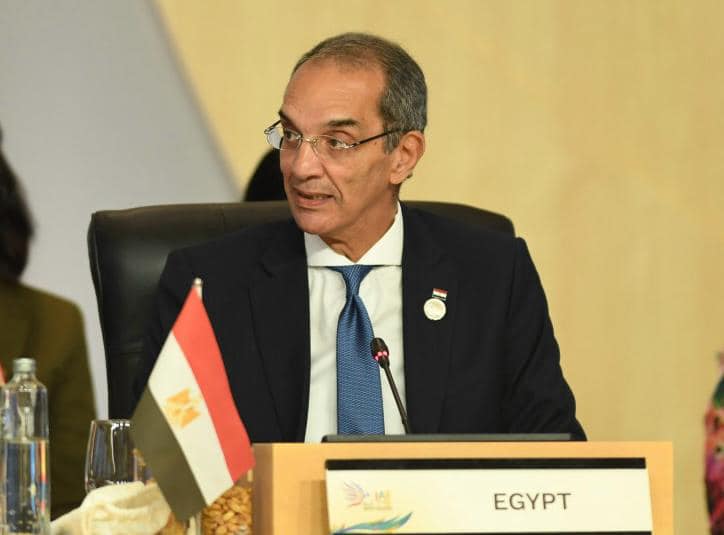The Minister of Communications and Information Technology Amr Talaat has delivered Egypt’s speech on behalf of President Abdel Fattah El-Sisi at the Joint Leaders’ Session during the 2nd Indonesia-Africa Forum (IAF), held on September 1-3, in Bali, Indonesia.
The Forum is attended by the President of Indonesia Joko Widodo and features the participation of over 800 attendees, including heads of state, government officials, public and private sector representatives, and academics from Africa and Indonesia, as well as international and regional organizations. It aims to strengthen economic cooperation and partnerships between Indonesia and Africa, building on the success of the first IAF in 2018.
In his speech, the ICT Minister emphasized Egypt’s pivotal role in driving technological convergence between Asia and Africa, which relies heavily on a robust, diverse, and secure international infrastructure. Over the past decades, Egypt has achieved connectivity through submarine cable systems that link Asia and Africa to the world, the ICT Minister explained.
Talaat underlined the importance of encouraging investments and expanding the network of submarine cables connecting Southeast Asia and Africa with the broader world to attain the desired levels of technological convergence. He added that this convergence has become a defining feature of international partnerships in the digital era, where digital connectivity has become indispensable.
The ICT Minister explained that the Digital Egypt strategy is implemented based on a citizen-centric approach designed to meet the increasing demand for digital government services with seamless and proactive delivery. He pointed out that the comprehensive strategy encompasses several key pillars: enhancing access to digital infrastructure, promoting digital literacy, building digital competencies, fostering digital innovation, and driving digital transformation across all public sectors.
Talaat stated that the New Administrative Capital was named the Arab Digital Capital for 2021 by the League of Arab States (LAS). He noted that Egypt moved up on the World Bank’s 2022 GovTech Maturity Index (GTMI), becoming among the countries of Group A, up from Group C in 2018.
Moreover, the ICT Minister outlined the Egyptian government’s efforts in implementing the Decent Life project, which aims to improve infrastructure and essential services in the most underserved villages. He explained that fiber optic cables are installed in approximately 10 million buildings and homes within these villages, with public-private partnerships established to expand the fiber optic network across all governorates.
The ICT Minister highlighted that the number of young people benefiting from digital skills development programs has surged more than 100-fold over the past six years. Egyptian youth, he noted, represent a driving force behind building Digital Egypt. Their burgeoning digital expertise is attracting foreign investments in the ICT sector, positioning Egypt as a premier destination in Africa for global offshoring companies planning to relocate their technical operations. The ICT Minister highlighted the government’s commitment to establishing partnerships with countries worldwide, like Indonesia, to advance towards a sustainable digital society.
Furthermore, Talaat pointed out that over the years, the Egyptian and Indonesian peoples have shared a long-lasting friendship that has thrived across various domains, including culture, education, and global politics. He also noted that Al-Azhar University is home to numerous distinguished Indonesian scholars who have made diverse scientific contributions to their respective fields.
Talaat added that nearly 70 years following the Bandung Conference, Indonesia remains a prominent symbol of solidarity, peace, and tolerance. He emphasized that amid today’s global challenges of economic hardship, geopolitical tension, and the climate crisis, the Bandung Conference’s 10 core principles of peaceful coexistence are more relevant than ever. These principles, central to the conference’s participants—many of whom had emerged from colonial rule—are crucial for fostering prosperous and peaceful economies for their people.
The ICT Minister mentioned that the current era is marked by mutual interdependence, extensive technological networks, and challenges that transcend geographical boundaries. He underlined that the 2nd IAF offers a valuable opportunity to explore new ways to discuss current national and continental priorities.
Africa’s Agenda 2063 and the recently adopted Digital Trade Protocol of the African Continental Free Trade Area (AfCFTA) reflect the shared aspirations that strengthen the bond between Africa and Indonesia, the ICT Minister stated. He said he looked forward to more collaboration in light of the profound economic, cultural, and political ties between Indonesia and African countries.
https://shorturl.at/RZpRe


